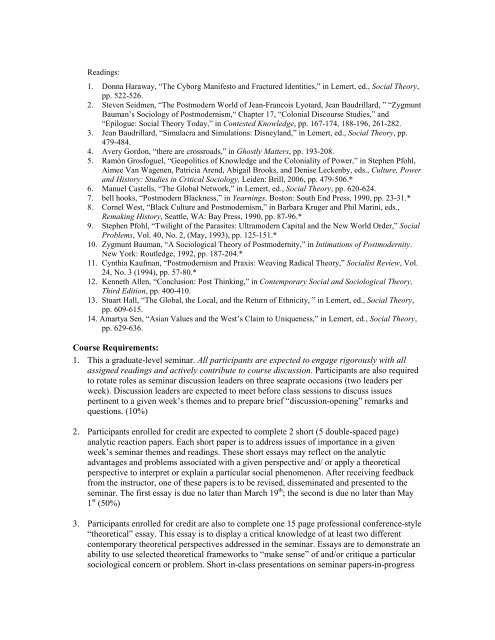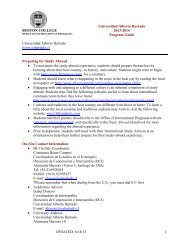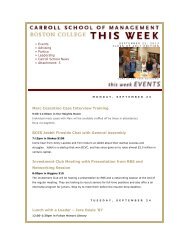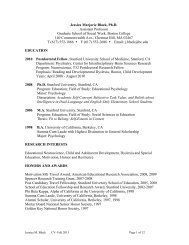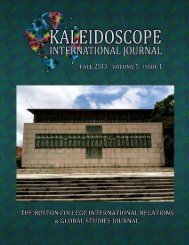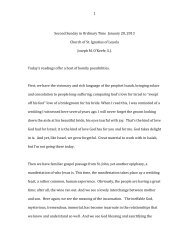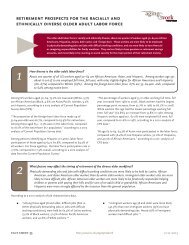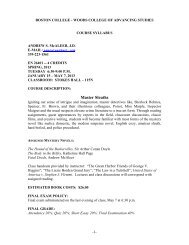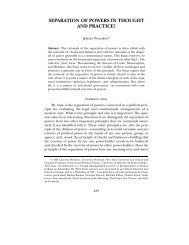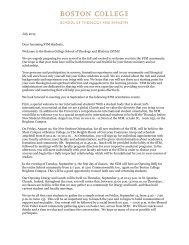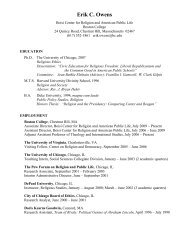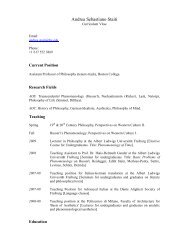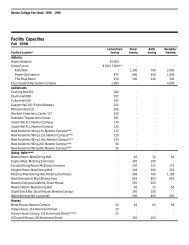Contemporary Social Theory - Boston College
Contemporary Social Theory - Boston College
Contemporary Social Theory - Boston College
You also want an ePaper? Increase the reach of your titles
YUMPU automatically turns print PDFs into web optimized ePapers that Google loves.
Readings:<br />
1. Donna Haraway, “The Cyborg Manifesto and Fractured Identities,” in Lemert, ed., <strong>Social</strong> <strong>Theory</strong>,<br />
pp. 522-526.<br />
2. Steven Seidmen, “The Postmodern World of Jean-Francois Lyotard, Jean Baudrillard, ” “Zygmunt<br />
Bauman’s Sociology of Postmodernism,“ Chapter 17, “Colonial Discourse Studies,” and<br />
“Epilogue: <strong>Social</strong> <strong>Theory</strong> Today,” in Contested Knowledge, pp. 167-174, 188-196, 261-282.<br />
3. Jean Baudrillard, “Simulacra and Simulations: Disneyland,” in Lemert, ed., <strong>Social</strong> <strong>Theory</strong>, pp.<br />
479-484.<br />
4. Avery Gordon, “there are crossroads,” in Ghostly Matters, pp. 193-208.<br />
5. Ramón Grosfoguel, “Geopolitics of Knowledge and the Coloniality of Power,” in Stephen Pfohl,<br />
Aimee Van Wagenen, Patricia Arend, Abigail Brooks, and Denise Leckenby, eds., Culture, Power<br />
and History: Studies in Critical Sociology, Leiden: Brill, 2006, pp. 479-506.*<br />
6. Manuel Castells, “The Global Network,” in Lemert, ed., <strong>Social</strong> <strong>Theory</strong>, pp. 620-624.<br />
7. bell hooks, “Postmodern Blackness,” in Yearnings. <strong>Boston</strong>: South End Press, 1990, pp. 23-31.*<br />
8. Cornel West, “Black Culture and Postmodernism,” in Barbara Kruger and Phil Marini, eds.,<br />
Remaking History, Seattle, WA: Bay Press, 1990, pp. 87-96.*<br />
9. Stephen Pfohl, “Twilight of the Parasites: Ultramodern Capital and the New World Order,” <strong>Social</strong><br />
Problems, Vol. 40, No. 2, (May, 1993), pp. 125-151.*<br />
10. Zygmunt Bauman, “A Sociological <strong>Theory</strong> of Postmodernity,” in Intimations of Postmodernity.<br />
New York: Routledge, 1992, pp. 187-204.*<br />
11. Cynthia Kaufman, “Postmodernism and Praxis: Weaving Radical <strong>Theory</strong>,” <strong>Social</strong>ist Review, Vol.<br />
24, No. 3 (1994), pp. 57-80.*<br />
12. Kenneth Allen, “Conclusion: Post Thinking,” in <strong>Contemporary</strong> <strong>Social</strong> and Sociological <strong>Theory</strong>,<br />
Third Edition, pp. 400-410.<br />
13. Stuart Hall, “The Global, the Local, and the Return of Ethnicity, ” in Lemert, ed., <strong>Social</strong> <strong>Theory</strong>,<br />
pp. 609-615.<br />
14. Amartya Sen, “Asian Values and the West’s Claim to Uniqueness,” in Lemert, ed., <strong>Social</strong> <strong>Theory</strong>,<br />
pp. 629-636.<br />
Course Requirements:<br />
1. This a graduate-level seminar. All participants are expected to engage rigorously with all<br />
assigned readings and actively contribute to course discussion. Participants are also required<br />
to rotate roles as seminar discussion leaders on three seaprate occasions (two leaders per<br />
week). Discussion leaders are expected to meet before class sessions to discuss issues<br />
pertinent to a given week’s themes and to prepare brief “discussion-opening” remarks and<br />
questions. (10%)<br />
2. Participants enrolled for credit are expected to complete 2 short (5 double-spaced page)<br />
analytic reaction papers. Each short paper is to address issues of importance in a given<br />
week’s seminar themes and readings. These short essays may reflect on the analytic<br />
advantages and problems associated with a given perspective and/ or apply a theoretical<br />
perspective to interpret or explain a particular social phenomenon. After receiving feedback<br />
from the instructor, one of these papers is to be revised, disseminated and presented to the<br />
seminar. The first essay is due no later than March 19 th ; the second is due no later than May<br />
1 st (50%)<br />
3. Participants enrolled for credit are also to complete one 15 page professional conference-style<br />
“theoretical” essay. This essay is to display a critical knowledge of at least two different<br />
contemporary theoretical perspectives addressed in the seminar. Essays are to demonstrate an<br />
ability to use selected theoretical frameworks to “make sense” of and/or critique a particular<br />
sociological concern or problem. Short in-class presentations on seminar papers-in-progress


